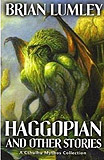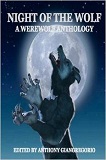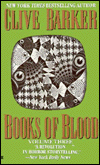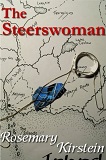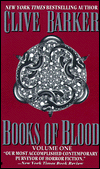
Books of Blood: Vol 1, by Clive Barker
Book Review by Jeff Edwards
Have you read this book?
This collection, the first in a trilogy, opens with "The Book of Blood," a haunted house story in the tradition of Richard Matheson's "Hell House." With the help of Simon McNeal, a twenty-year-old medium, the Essex University Parapsychology Unit records solid evidence of life after death at Number 65, Tollington Place. Dr. Mary Florescu is ecstatic to see such results after a lifetime's work in the field. But the "ghost writing" scrawled on the walls of an upstairs room turns out to be a hoax committed by McNeal, and the dead demand satisfaction. Using a method of torture inspired by Kafka's "In the Penal Colony," the restless spirits find a way to tell their stories.
In "The Midnight Meat Train," Barker molds together sex and death, vomit and excrement into a messy organic sculpture, an intense and relentless tale of a murderer prowling the New York subway trains, providing meat for the "City fathers." This is a story of opened entrails, partially disemboweled corpses, meat cleft open, muscle pulled back, and glistening vertebrae. Barker's mouth seems to be watering as he writes, "[T]he exposed meat of the thigh was like prime steak, succulent and appetizing." In Barker's work, characters' bodily functions are described in loving detail: when an unlucky passenger sees the Butcher's handiwork, the sandwich he had eaten earlier goes "half-way up his gullet, catching in the back of his throat," and as the Butcher approaches the passenger's hiding place, the man is "suddenly aware of how full his bowels were." The entire framework of the story is sexual, with its phallic train rushing through the subway tunnels. Even moving from one subway car to the next is described in terms both gruesome and sexual: "[He] skinned his way through the slit he had opened and so through to the bloody chamber beyond."
After the overwhelming gore of "The Midnight Meat Train," Barker shows a much lighter touch with "The Yattering and Jack," an amusing holiday tale about a lower demon tasked with driving a man insane. Also displaying some morbid humor, "Sex, Death and Starshine" is the (decomposing) tongue-in-cheek story of a doomed Shakespeare production and a mysterious man who is determined to see his dead wife on stage for the final curtain call.
The two flawed stories in Barker's collection seem akin to "Night Shift"-era Stephen King, but ultimately fail because of ridiculous subject matter or heavy-handed symbolism. The opening scenes of "Pig Blood Blues," with a new teacher joining the Tetherdowne Remand Center for Adolescent Offenders, feel like King's "Sometimes They Come Back" - but Barker's story collapses with the appearance of a possessed pig that has developed a taste for human flesh.
"In the Hills, the Cities" is reminiscent of King's "Children of the Corn," with its protagonists arguing in the car during a road trip and encountering empty towns. While King's story began with Burt and Vicky bickering as they drove through the cornfields of Nebraska, Barker's tale starts with Judd and Mick fighting in the car and then making up in the wheatfields of Yugoslavia. They discover the twin cities of Popolac and Podujevo engaged in a "ritual battle," the inhabitants of each city gathered together and "moving as one creature, one perfect giant." Judd is ranting about communism at the beginning of the story, and the human giants later personify this "Trotskyist tripe." Tens of thousands of men, women and children are "harnessed to each other in a living system that allowed for no single voice to be louder than any other, nor any back to labour less than its neighbor's." In addition to laying on the symbolism a bit too thick, Barker succumbs to his propensity to overwrite, with passages like, "Night was approaching, mercifully bandaging up the wounds of the day, blinding eyes that had seen too much."
Barker's writing fares best when he gleefully splatters the gore or adds the light touch of humor to horror. For readers who have not yet sampled the twisted visions of Clive Barker, Books of Blood: Volume One is an excellent place to start.
In "The Midnight Meat Train," Barker molds together sex and death, vomit and excrement into a messy organic sculpture, an intense and relentless tale of a murderer prowling the New York subway trains, providing meat for the "City fathers." This is a story of opened entrails, partially disemboweled corpses, meat cleft open, muscle pulled back, and glistening vertebrae. Barker's mouth seems to be watering as he writes, "[T]he exposed meat of the thigh was like prime steak, succulent and appetizing." In Barker's work, characters' bodily functions are described in loving detail: when an unlucky passenger sees the Butcher's handiwork, the sandwich he had eaten earlier goes "half-way up his gullet, catching in the back of his throat," and as the Butcher approaches the passenger's hiding place, the man is "suddenly aware of how full his bowels were." The entire framework of the story is sexual, with its phallic train rushing through the subway tunnels. Even moving from one subway car to the next is described in terms both gruesome and sexual: "[He] skinned his way through the slit he had opened and so through to the bloody chamber beyond."
After the overwhelming gore of "The Midnight Meat Train," Barker shows a much lighter touch with "The Yattering and Jack," an amusing holiday tale about a lower demon tasked with driving a man insane. Also displaying some morbid humor, "Sex, Death and Starshine" is the (decomposing) tongue-in-cheek story of a doomed Shakespeare production and a mysterious man who is determined to see his dead wife on stage for the final curtain call.
The two flawed stories in Barker's collection seem akin to "Night Shift"-era Stephen King, but ultimately fail because of ridiculous subject matter or heavy-handed symbolism. The opening scenes of "Pig Blood Blues," with a new teacher joining the Tetherdowne Remand Center for Adolescent Offenders, feel like King's "Sometimes They Come Back" - but Barker's story collapses with the appearance of a possessed pig that has developed a taste for human flesh.
"In the Hills, the Cities" is reminiscent of King's "Children of the Corn," with its protagonists arguing in the car during a road trip and encountering empty towns. While King's story began with Burt and Vicky bickering as they drove through the cornfields of Nebraska, Barker's tale starts with Judd and Mick fighting in the car and then making up in the wheatfields of Yugoslavia. They discover the twin cities of Popolac and Podujevo engaged in a "ritual battle," the inhabitants of each city gathered together and "moving as one creature, one perfect giant." Judd is ranting about communism at the beginning of the story, and the human giants later personify this "Trotskyist tripe." Tens of thousands of men, women and children are "harnessed to each other in a living system that allowed for no single voice to be louder than any other, nor any back to labour less than its neighbor's." In addition to laying on the symbolism a bit too thick, Barker succumbs to his propensity to overwrite, with passages like, "Night was approaching, mercifully bandaging up the wounds of the day, blinding eyes that had seen too much."
Barker's writing fares best when he gleefully splatters the gore or adds the light touch of humor to horror. For readers who have not yet sampled the twisted visions of Clive Barker, Books of Blood: Volume One is an excellent place to start.
|
Click here to buy Books of Blood: Vol 1, by Clive Barker on Amazon
|
Books of Blood: Vol 1, by Clive Barker on Amazon

| More Books You Might Like |
Comment on Books of Blood: Vol 1, by Clive Barker
| Comments on Books of Blood: Vol 1, by Clive Barker |
| There are no comments on this book. |
